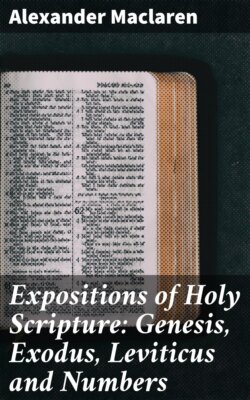Читать книгу Expositions of Holy Scripture: Genesis, Exodus, Leviticus and Numbers - Alexander Maclaren - Страница 34
На сайте Литреса книга снята с продажи.
II
ОглавлениеMany years have passed since Abram was called to go forth from his father's house, assured that God would make of him a great nation. They had been years of growing power. He has been dwelling at Mamre, as a prince among the people of the land, a power. There sweeps down on Southern Palestine the earliest of those invasions from the vast plains of the North which afterwards for generations were the standing dread of Abram's descendants. Like the storm pillars in their own deserts, are these wild marauders with the wild names that never appear again in the history. Down on the rich valleys and peaceful pasture lands they swoop for booty, not for conquest. Like some sea-bird, they snatch their prey and away. They carry with them among the long train of captives Abram's ungenerous brother-in-law, Lot. Then the friend of God, the father of the faithful, musters his men, like an Arab sheikh as he was, and swiftly follows the track of the marauders over the hills of Samaria, and across the plain of Jezreel. The night falls, and down he swoops upon them and scatters them. Coming back he had interviews with the King of Sodom, when he refuses to take any of the spoil, and with Melchizedek. Abram is back at Mamre. How natural that fear and depression should seize him: the reaction from high excitement; the dread that from the swarming East vengeance would come for his success in that night surprise; the thought that if it did, he was a wandering stranger in a strange land and could not count on allies. Then there would come, perhaps, the remembrance of how long God had delayed the very beginnings of the fulfilment, 'Seeing I go childless.'
To this mood of mind the divine vision is addressed. 'Fear not—I am thy shield' whatever force comes against thee, 'and thine exceeding great reward,'—perhaps in reference to his refusal to take anything from the spoil. But God says this to us all. In these antique words the very loftiest and purest principles of spiritual religion are set forth.
He that loves and trusts God possesses God.
He that possesses God has enough for earth.
He that possesses God has enough for heaven.
1. It is possible for a man to have God for his. 'I am thy Reward,'—not merely Rewarder, but Reward.
How can one spiritual Being belong to another?—plainly, By mutual love.
The Gospel assures us of God's love, and makes it possible for ours to be fixed on Him.
Faith gives us God for ours.
The highest view of the blessings of the Gospel is that God Himself becomes our reward.
How sad the insanity of men appears, in the ordinary aims of their life, its rewards and its objects of desire! How they chase after variety!
How much loftier and truer a conception of the blessing of religion this is than notions of mere escape and the like!
2. The possession of God is enough for earth.
God the all-sufficient object for our spirits, His love, the communication of Himself, the sense of His presence, the depths of His infinite character, of His wondrous ways, of His revealed Truth as an object for thought: of His authoritative will as imperative for will and conscience: aspiration towards Him.
God the Eternal Object.
To find Him in everything, and everything in Him, is to be at rest.
This is what He promises—
Not a life of outward success and ease—much nobler than if He did.
Take Abram's as a type.
In war He will be our Defence.
In absence of other joys He will be Enough.
Sphered and included in Him is all sweetness. He sustains all relations, and does for us what these other joys and goods partially do.
The possession of His love should put away all fear, since having Him we are not at the mercy of externals.
What, then, is Life as men ordinarily make it?—what a blunder!
3. To possess God is enough for heaven.
Such a relationship is the great proof of immortality.
Christ and Sadducees.
The true glory of heaven is in fuller possession of God: no doubt other things, but these subsidiary.
The Reward is God.
The idea of recompense ample and full for all sorrow.
More than adequate wages for all work.
That final reward will show how wise the wanderer was, who left his father's house and 'looked for a city.' God is not ashamed to be called their God.
Christ comes to us—offers Himself.
Think of how rich with Him, and oh, think of how poor without Him!
Which will you have on earth?
Which will you have in another world?
